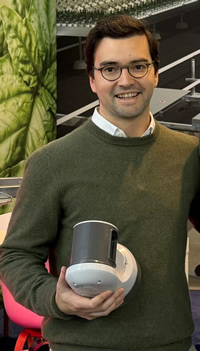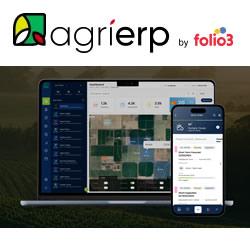"I am particularly proud of Gardin’s recent achievements with our customers. With Bayer Crop Science, we increased their pepper yields in Seville whilst using 25% less water..” Miguel Jordao, Head of Strategy.
 Optimizing Farm Yields
Optimizing Farm Yields

Q&A with Miguel Jordao, Head of Strategy | Gardin
Can you provide an overview of your role and responsibilities at Gardin?
As part of Gardin's executive team, I am responsible for developing the company's business strategy. I also oversee some of our key commercial partnerships and work closely with our CEO to implement our capital allocation plan.
What inspired you to join Gardin and become involved in the agritech sector?
Whilst I started my career in financial services over a decade ago, I knew I eventually wanted to pursue more tangible work. AgriTech was a natural choice, as it combines the critical need to improve unsustainable food production with complex problem-solving to build a scalable, durable business in the sector. Working at Gardin has been incredibly rewarding, as we are able to create real value for growers. Our solutions enable more food to be produced using fewer resources, which has a meaningful impact. This direct contribution to improving the sustainability of food production has been an extremely fulfilling part of my career journey.
How do you see Gardin's solutions impacting the future of agriculture, particularly in terms of sustainability, efficiency, and food security?
Our CEO started Gardin on the belief that the fresh produce industry utilises sub-optimal metrics to evaluate produce along the value chain. A classic example being the perfectly shaped tomatoes you can buy from supermarkets that can be tasteless and unfulfilling. The metrics that got those tomatoes on the shelves are mostly cosmetic and do not tell you much about their nutritional density. Enter Gardin. Through our proprietary platform, we measure crop physiology at scale and in real time. For the first time, growers can measure the health of their crops and take corrective action before it is too late. Our health metric has a strong correlation with yield and is a true north star for growing better crops.
Can you discuss any recent milestones or achievements Gardin are particularly proud of?
I am especially proud of Gardin’s recent achievements with customers. With Bayer Crop Science, we increased their pepper yields in Seville whilst using 25% less water. With FromBoer, one of the world’s leading lettuce greenhouses, we increased their productivity by 5%, which represents a ~10x ROI for the grower.
Collaboration and partnerships are often essential in the agritech industry. Could you speak to any strategic collaborations or partnerships Gardin has formed to further its mission?
Absolutely. We are firm believers in effective partnerships and are proud to work closely with companies such as Agrolux, a leading horticultural lighting company, and Ridder, a pioneering climate control specialist for the greenhouse sector. With these partners, we are able to develop cutting edge solutions that allow growers to produce more with fewer resources. We will be announcing developments soon.
.jpg)
What is Gardin’s strategy and how do you ensure that Gardin's innovations are both scientifically rigorous and practically applicable for farmers in the field?
Agriculture is traditionally associated with long feedback loops and a risk-averse stakeholder base. Given these dynamics, it is not surprising that many start-ups have struggled with traction. At Gardin, we understood early that to scale fast we needed a intense focus on building “Credibility”. Only with Credibility can you shorten sales cycles and earn the trust of growers. To achieve it, we had to produce the fastest and cleanest ROI in the sector and to choose the right partners to work with. This is challenging to execute as you cannot miss your chances – growers are rather busy and not interested in doing R&D for you. However, the team did brilliantly and through this process, in just 12 months of commercial activity Gardin has deployed more than 150 sensors in 10 countries.
In your opinion, what are the most pressing opportunities or areas for innovation in agriculture today, and how is Gardin positioned to address them?
Unpredictable climate conditions are driving more agriculture indoors, through increased greenhouse capacity. Simultaneously, there is policy pressure on indoor growers to reduce carbon emissions. This is pushing growers to transition from high-pressure sodium (HPS) to LED lighting and to use less supplemental CO2. These trends suggest two key challenges: 1) More growers need to learn indoor cultivation techniques. 2) A larger group must understand how resource consumption impacts crop yields. This presents a promising context for innovation, particularly in technologies that can optimize operational efficiency and profitability for indoor growers.
Looking ahead, what is the vision and goal for Gardin's future development and impact in the agritech space?
 At Gardin, we are developing better metrics for the entire food value chain. Our first step is to become ubiquitous in protected cropping, and then gradually expand upstream (inputs) and downstream (processors, FMCG companies). To achieve this, we must continue to deliver positive ROI and demonstrate the power of plant-driven growing to growers. We know that stakeholders along the food value chain are incentivized to adopt better metrics, but have historically struggled with grower adoption. By focusing on what growers care about most (higher yields and lower costs), Gardin will unlock value for the entire chain.
At Gardin, we are developing better metrics for the entire food value chain. Our first step is to become ubiquitous in protected cropping, and then gradually expand upstream (inputs) and downstream (processors, FMCG companies). To achieve this, we must continue to deliver positive ROI and demonstrate the power of plant-driven growing to growers. We know that stakeholders along the food value chain are incentivized to adopt better metrics, but have historically struggled with grower adoption. By focusing on what growers care about most (higher yields and lower costs), Gardin will unlock value for the entire chain.
For more information on Gardin please visit www.gardin.ag/contact
The content & opinions in this article are the author’s and do not necessarily represent the views of AgriTechTomorrow
Comments (0)
This post does not have any comments. Be the first to leave a comment below.
Featured Product

